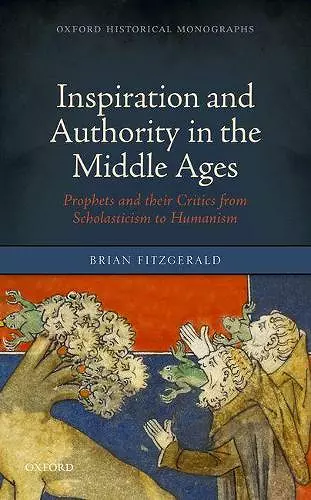Inspiration and Authority in the Middle Ages
Prophets and their Critics from Scholasticism to Humanism
Format:Hardback
Publisher:Oxford University Press
Published:28th Sep '17
Currently unavailable, and unfortunately no date known when it will be back

Inspiration and Authority in the Middle Ages rethinks the role of prophecy in the Middle Ages by examining how professional theologians responded to new assertions of divine inspiration. Drawing on fresh archival research and detailed study of unpublished manuscript sources from the twelfth to fourteenth centuries, this volume argues that the task of defining prophetic authority became a crucial intellectual and cultural enterprise as university-trained theologians confronted prophetic claims from lay mystics, radical Franciscans, and other unprecedented visionaries. In the process, these theologians redescribed their own activities as prophetic by locating inspiration not in special predictions or ecstatic visions but in natural forms of understanding and in the daily work of ecclesiastical teaching and ministry. Instead of containing the spread of prophetic privilege, however, scholastic assessments of prophecy from Peter Lombard and Thomas Aquinas to Peter John Olivi and Nicholas Trevet opened space for claims of divine insight to proliferate beyond the control of theologians. By the turn of the fourteenth century, secular Italian humanists could lay claim to prophetic authority on the basis of their intellectual powers and literary practices. From Hugh of St Victor to Albertino Mussato, reflections on and debates over prophecy reveal medieval clerics, scholars, and reformers reshaping the contours of religious authority, the boundaries of sanctity and sacred texts, and the relationship of tradition to the new voices of the Late Middle Ages.
In his thoroughly researched and carefully argued monograph, Brian FitzGerald offers a detailed and nuanced account of the ways in which prophecy and authority intersected among the scholastic theologians of the Later Middle Ages. * Ian Christopher Levy, Speculum *
It is perhaps a testament to FitzGerald's achievement that in addressing a seemingly simple question ('What was prophecy?'), he paints a picture of such nuance and depth that it generates as many new questions as it answers. * Laura Ackerman Smoller, University of Rochester, Journal of Ecclesiastical History *
Inspiration and Authority in the Middle Ages is very valuable because it traces a genealogy of late medieval prophecy that undercuts the Joachite understanding that has dominated the research area for decades. Fitzgerald demonstrates that the interests of the late Middle Ages and those of the Renaissance are closer than many would think. This book is warmly recommended. * Carole Cusack, Reading Religion *
timely, useful and extremely interesting ... The work in this book provides a long-overdue insight into the development of a powerful discourse, a tool for spiritual understanding which became an important weapon in peace and war from the 12th to the 16th centuries, and beyond. Fitzgerald's work gives the reader an idea of prophecy's importance for the Church herself, her texts, her unity and her place in history. ... Although not designed for general readers, students and scholars of prophecy (of all kinds), theology, the medieval Church, historiography and medieval historians, philosophy and the beginnings of Renaissance humanism and of literature and poetry will all be able to read this book and come away with something of value. * Dr Lesley Coote, Reviews in History *
ISBN: 9780198808244
Dimensions: 223mm x 148mm x 23mm
Weight: 488g
290 pages